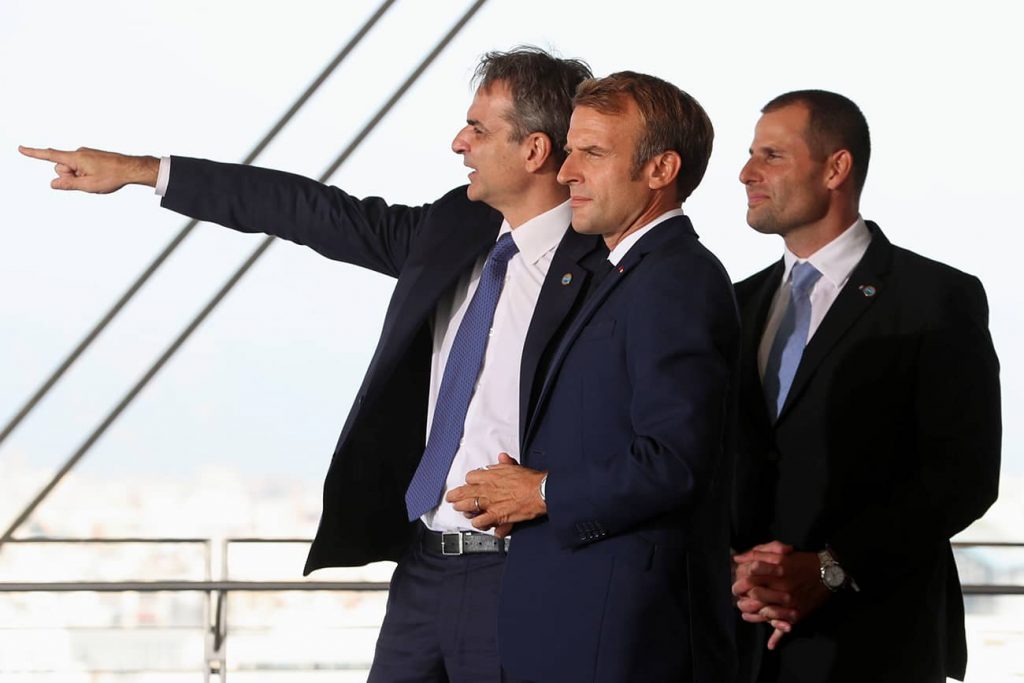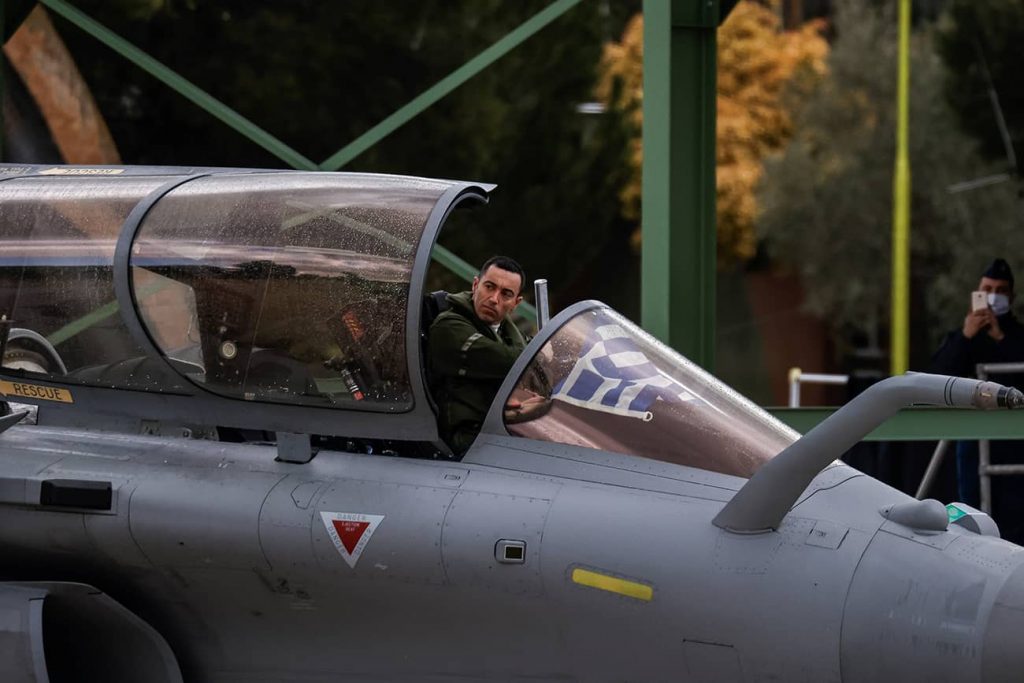The Eastern Mediterranean is on the frontlines of a struggle for peace and economic development at a time when maritime delimitation disputes have increased the likelihood of confrontation. Greece is a regional country that has demonstrated its commitment to conflict resolution and management and to cooperative partnerships, thus turning itself practically into a source and provider of solutions.
Greece, in fact, pursues dynamic foreign and defense policies to counter Turkey’s expansionism and the so-called “gunboat diplomacy” that undermines regional stability and good neighborly relations. Gunboat diplomacy centers on the employment of naval power in Turkey’s pursuit of the “blue homeland” doctrine of controlling the Mediterranean and implying the threat of war, should Turkish claims over vast sections of the Aegean and Mediterranean Seas not be accepted.
To counter Turkish assertiveness, Greece has enhanced engagement with the US, France, and the regional countries. Athens has expanded its bilateral strategic dialogue with the US to include all major pillars of the Greece–US partnership, ranging from energy and investment to defense and people-to-people contacts. Athens and Washington signed an extension of the Mutual Defense Cooperation Agreement, which contains a clause that affirms both countries’ determination to mutually safeguard and protect the sovereignty and territorial integrity of the other against actions threatening peace, which include armed attacks or threats of the use of force against the other’s territory.
This extended defense agreement shields Athens against Turkish expansionism and its threat of war with Greece. It also allows US forces to train in additional locations throughout Greece, providing the proper context for Washington to invest defensively in the country as it withdraws from other parts of the region. Alexandroupolis is located in the broader region of Thrace and has been transformed into an advanced facility, which not only allows the stationing of US forces but also the cementing of an emerging axis toward Bulgaria. The latter has become highly valuable for Washington’s and NATO’s strategic planning as an alternative route to the Straits of Bosphorus, given the importance of the Black Sea.

On a parallel level, Greece has solidified relations with France and has signed a defense agreement that not only upgrades its geopolitical footprint in Europe but also strengthens Greek deterrence capabilities, with the purchase of three state-of-the art French Belharra frigates by 2025. Greece is shielded against military actions, especially in the Eastern Mediterranean, as the agreement contains a mutual defense assistance clause in the event of an attack against one’s territory. It is noteworthy that Article 42 (7) of the Treaty of European Union on the mutual defense clause becomes substantial through the Greece–France defense agreement. A similar mutual defense clause is also contained in the defense agreement that was signed between Greece and the United Arab Emirates in early 2021.
Additionally, Athens actively participates in multinational air and naval exercises for defense-oriented purposes that are conducted frequently across the Mediterranean Sea. For example, the air forces of France, Germany, Greece, India, Israel, Italy, UK, and the US participated in Israeli-hosted joint exercises, code-named Blue Flag in October 2021. The goal of the exercise was to strengthen international cooperation, the coordination of fifth- and fourth-generation fighter jets in a challenging operational environment, and to enhance the operational capabilities of the air forces of the countries involved in the exercise.

In principle, Greece is committed to dialogue with neighbors and to resolving disputes peacefully through diplomacy and in accordance with international law. Athens signed in good faith maritime delimitation agreements with Italy and Egypt in 2020 and has repeatedly stated its readiness to resume negotiations with the rest of its neighboring countries, including Turkey and Libya, aiming at concluding similar agreements, in full respect of the provisions of the UN Convention of Law of the Sea. The partial delimitation agreement with Egypt is the outcome of 15 years of negotiations, which, in accordance with the UNCLOS, recognizes all the rights of coastal states in their maritime zones. The agreement disregards the Turkish assertion that Greek islands do not have an exclusive economic zone and abides by Article 121 of the UNCLOS, which specifies that islands have a right to territorial sea, contiguous zones, EEZ, and continental shelf in line with provisions applied in mainland areas.
The benefits that Egypt, Greece, and the region will reap from the delimitation agreement, including—but not limited to—attraction of international investment in oil and gas exploration within demarcated maritime areas; prevention of Turkey from drilling in Libyan maritime areas that extend to Egyptian waters; facilitation of infrastructure projects; and the execution of electricity interconnectors that will link the power grids of regional countries to Europe. Electricity interconnections will enable excess power to be traded and shared between countries, and Greece plays a critical role in this regard. The EuroAsia interconnector will connect the national power grids of Israel, Cyprus, and Greece through a subsea cable, along with the EuroAfrica interconnector that will export surplus Egyptian electricity to Europe.
On the strictly bilateral level, Greece stands solidly behind the resolution of disputes with Turkey through dialogue for settling the only bilateral difference, which is the demarcation of the continental shelf and the respective maritime zones. But resolution of differences entails commitment to international principles. That said, the declared Turkish position that islands in the Eastern Mediterranean and the Greek islands in particular should carry no weight in determining the maritime boundaries, especially because the Aegean Sea is semi-enclosed, is null and void. Greece has 3,100 islands of which 2,463 are in the Aegean Sea. By comparison, Turkey has only three islands in the Aegean. The Turkish argument that Greek islands cannot create maritime zones because the Aegean is a semi-enclosed sea is invalid especially when considering that Ankara delineated its EEZ with the former Soviet Union in the Black Sea, which is semi-enclosed on the equidistance method. Specifically, in 1986, Turkey unilaterally proclaimed a two-hundred-mile EEZ in the Black Sea in accordance with the provisions of UNCLOS, which Turkey—paradoxically—has never signed. All this exposes Turkey’s double standards and selective enforcement of international law and takes Ankara further down the pathway of unreliability.
One thing should be crystal clear, that in case Greek–Turkish talks do not reach a common ground in due time, then the issue of the continental shelf should be referred to the International Court of Justice, which, as the leading UN judicial entity, can produce binding rulings in disputes between states that have agreed to appeal to it. The ICJ has settled differences between states over delimitation of their continental shelf, the most prominent being the delimitation of the maritime boundary in the Gulf of Maine in 1981, the demarcation of the Black Sea in 2007, and the North Sea continental shelf cases in 1969.
Another avenue for settling maritime differences between Greece and Turkey is arbitration before the Permanent Court of Arbitration. The PCA facilitates arbitration and dispute resolution between countries over legal issues, including territorial and maritime boundaries. The arbitration case between the Philippines and China over the South China Sea can serve as a model for the settlement of competing EEZ claims between Greece and Turkey due to the apparent similarities between the competing claims of the countries involved.
Overall, Turkey’s expansionism into the waters of the Eastern Mediterranean over the last several years not only rekindled maritime differences with Greece over the delineation of their maritime zones but also caused Ankara’s tense relations to surface with almost every country in the region and with the EU. Turkey has moved from the so-called “zero-problems with neighbors” concept to the practice of “problems with almost every single neighbor.” The Turkish strategy is perceived as preventing regional countries from monetizing their energy resources in the Eastern Mediterranean while enabling Ankara to expand its military footprint in Northern Syria, Northern Iraq, Qatar, Mogadishu, Somalia, and Libya. This transformational shift is attributed to the Turkish leadership’s worldview that Turkey, as the legitimate successor of the Ottoman Empire, should be the focus of reestablishing the Middle East and Eastern Mediterranean regions.
Against this backdrop, regional countries that advocate for good neighborly relations and maintain common principles and values intensify their cooperation mechanisms in the Eastern Mediterranean to collectively address common challenges and explore opportunities. The East Mediterranean Gas Forum falls in this category. The Forum, a regional cooperation platform of dialogue between governments, has become both an avenue of communication between states and the energy industry and a clearing house for ideas and plans for mutually beneficial energy development in the region.
All things considered, Greece, a uniquely positioned country in the Eastern Mediterranean, is committed to peaceful resolution of differences with neighbors. Greece advocates for economic opportunities, as well as for the development of energy resources in the Eastern Mediterranean, which must be a cooperative enterprise rather than a zero-sum game. As the region’s geopolitical ground is shifting rapidly, this is a path that Athens will continue to pursue for the safeguarding of its national security and regional stability.

